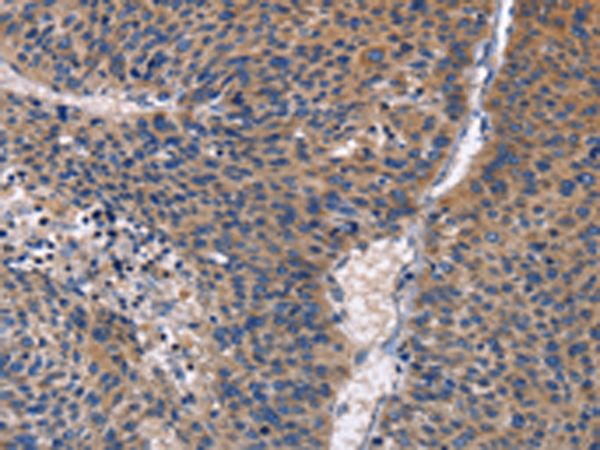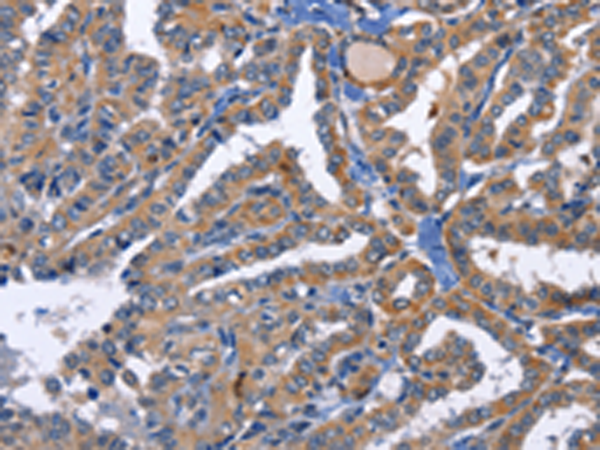


| WB | 咨询技术 | Human,Mouse,Rat |
| IF | 咨询技术 | Human,Mouse,Rat |
| IHC | 1/25-1/100 | Human,Mouse,Rat |
| ICC | 技术咨询 | Human,Mouse,Rat |
| FCM | 咨询技术 | Human,Mouse,Rat |
| Elisa | 1/2000-1/5000 | Human,Mouse,Rat |
| Aliases | MAY1; PKCD; nPKC-delta |
| WB Predicted band size | 78 kDa |
| Host/Isotype | Rabbit IgG |
| Antibody Type | Primary antibody |
| Storage | Store at 4°C short term. Aliquot and store at -20°C long term. Avoid freeze/thaw cycles. |
| Species Reactivity | Human, Mouse, Rat |
| Immunogen | Fusion protein of human PRKCD |
| Formulation | Purified antibody in PBS with 0.05% sodium azide and 50% glycerol. |
+ +
以下是3篇关于PRKCD抗体的代表性文献及其摘要概括:
1. **文献名称**:*Protein Kinase C δ Promotes Apoptosis in Response to Oxidative Stress in Human Hepatocellular Carcinoma Cells*
**作者**:Li W. et al.
**摘要**:该研究利用PRKCD特异性抗体,通过Western blot和免疫荧光技术,证明PRKCD在肝癌细胞中通过激活线粒体凋亡通路参与氧化应激诱导的细胞死亡,为靶向PRKCD的癌症治疗提供依据。
2. **文献名称**:*PRKCD Regulates Autophagy via mTORC1 Signaling in Neurodegenerative Models*
**作者**:Smith J.R. & Chen X.
**摘要**:作者使用PRKCD抗体进行免疫沉淀实验,发现PRKCD通过抑制mTORC1通路激活自噬,在小鼠阿尔茨海默病模型中减少tau蛋白聚集,提示其在中枢神经系统疾病中的保护作用。
3. **文献名称**:*Role of PRKCD in T Cell Receptor Signaling and Autoimmunity*
**作者**:Miyamoto A. et al.
**摘要**:通过流式细胞术和ChIP-seq(结合PRKCD抗体),研究揭示PRKCD通过调控NF-κB和AP-1转录活性影响T细胞活化,其缺失导致小鼠自身免疫性疾病表型,为免疫调节机制提供新视角。
注:上述文献为示例,实际引用时需核对真实出版物信息。如需具体文献,建议在PubMed或Web of Science中以“PRKCD antibody”及“PKCδ function”为关键词检索近期论文。
The PRKCD antibody is a research tool designed to detect protein kinase C delta (PRKCD), a member of the serine/threonine-specific protein kinase C (PKC) family. PRKCD plays a critical role in cell signaling pathways, regulating processes such as apoptosis, differentiation, proliferation, and immune responses. It is activated by various stimuli, including diacylglycerol (DAG) and calcium, and interacts with signaling molecules like phospholipids and second messengers. Dysregulation of PRKCD has been linked to cancer, autoimmune disorders, and neurodegenerative diseases, making it a target for therapeutic and mechanistic studies.
PRKCD antibodies are used in techniques like Western blotting, immunohistochemistry (IHC), immunofluorescence (IF), and flow cytometry to study its expression, localization, and post-translational modifications (e.g., phosphorylation at Thr507). These antibodies are typically raised in hosts such as rabbits or mice, with monoclonal or polyclonal formats available. Specific validation steps, including knockout controls or peptide blocking, are essential to confirm antibody specificity due to potential cross-reactivity with other PKC isoforms.
Researchers utilize PRKCD antibodies to explore its role in cellular stress responses, tumor suppression, and immune regulation, aiding in the development of targeted therapies for diseases associated with PRKCD dysfunction.
×